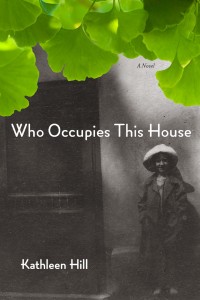Editors’ Choice—NEW YORK TIMES
“A memorable portrait of a family’s identity.”—PUBLISHERS WEEKLY
KATHLEEN HILL’S finely wrought novel tells the story of four generations of an Irish-American family that has lived in the same house for almost a century. Grieving the death of her mother and the imminent sale of the house, the narrator sets out to re-create the hidden, intimate lives of those who came before. Through a series of vignettes she conjures a family devastated in each generation by the loss of a child.
The narrator’s project, inspired at the outset by silences that extend backward to the untold story of the Famine, turns into a vast exploration of loss, inheritance, and the nature of memory. In a voice both stark and lyrical, the narrator calls up transformative, often tragic, moments in lives that have shaped her own. Remembering a past she never knew, she hopes to release from its sway the vanishing present.
Who Occupies This House is a strikingly beautiful account of the difficult reckoning with one’s family legacy that every adult faces. Punctuated by photographs and images that bring the narrative into sharp focus, it will draw comparisons to such divergent writers as W.G. Sebald and Kate O’Brien.
Praise for Who Occupies This House
“The lyricism of the writing, ethereal and dreamlike, elegiac in tone, complements the narrator’s somber journey, which reads like an extended prose poem.”—BOOKLIST
“This is a novel of great beauty. Step by step, it works its way deep into the interior lives of vanished family, sifting through evidence to solve mysteries, rejudge sorrows, and think, over and over, about forgiveness. An intense, exacting, and extraordinary book.”—JOAN SILBER
“If you love Howards End, To the Lighthouse, Joyce’s Dubliners; if you keep returning to Proust’s Combray, this is the book for you. A work of pure and intense lyricism, it explores the question of American identity, calling upon the spirit of Emily Dickinson most particularly. And at the same time, with a truly original depth and breadth of imagination, it looks to the presence of Ireland and Irishness, a potent dream hovering over the lives of Irish Americans.”—MARY GORDON
“Part history, and part hypothesis, Kathleen Hill’s family memoir is a lyrical evocation of three generations whose spirits live on in those dwelling places that they have loved. This is a haunted book in the best sense: these lives, these spirits, beautifully portrayed, will stay with you forever.”—CHARLES BAXTER
“Who Occupies This House asks us, brilliantly, to consider and reconsider the long lines of suffering and the legacies of the past. But it is also a narrative of passion and faith and sweetness and long affections as the Conroys and the Carmodys seek and find their family. With fierce intelligence and lustrous prose Kathleen Hill takes the reader on a remark-able journey stretching from Ireland to America and back again. I was transported by this book.”—MARGOT LIVESEY
“Kathleen Hill has written a book so profound it’s almost dangerous to read. Who Occupies This House asks us to journey through time and space, through the layers of a life unique in its particulars, but so like our own we will not be unchanged if we go with her. Where is the boundary between the living and the dead? Who is each of us apart from all the others? What unsaid sentences determine the syntax of our lives without our knowing it? How can one person’s search illuminate so many others and redeem what some of them never knew was there? This book is radiant changing light—as vivid and mysterious as life itself.”—MARIE HOWE
“Who Occupies This House can be read as a generational memoir, a novel, and prose poetry, just as it confirms its allegiances to the past, the present, and the future. Irish-American experience has many times been a powerful subject, and its treatment here is made even more searching and unsettling through the use of dialogic and postmodernist techniques. Hill”s beautifully composed chapters extend their reach by including excerpted lyrics as well as family photographs; it’s as though Virginia Woolf had read Dickinson and W. G. Sebald. Finally, though, all gathers into incandescent vision, a personal annunciation that carries the author backward to origins and forward to individual destiny. The book itself becomes a house where we live for the duration, emerging with a sense of awe and gratitude for a level of achievement seldom equaled in the literature of our time.”—ALFRED CORN
“‘How keenly she felt along her nerves the vanishing moment,’ Kathleen Hill’s book is a profuse and gorgeous reverie of memory, noticing, and vivid invention. With a deep sense of the intricacy and mystery of human motives, disappointments, and grief, and of whole personalities (even the personalities of inherited objects), Hill leads us into a family story of both grief and love of life. She seeks visitations by the dead, and when they come they produce both exaltation and dread, which Hill describes as fully as anyone could. Out of contrition, it seems, she restores her dead to the world they were forced to abandon, and yet she must feel all the more keenly their absence. This book of the uncanny is memorable and unique”—REGINALD GIBBONS


